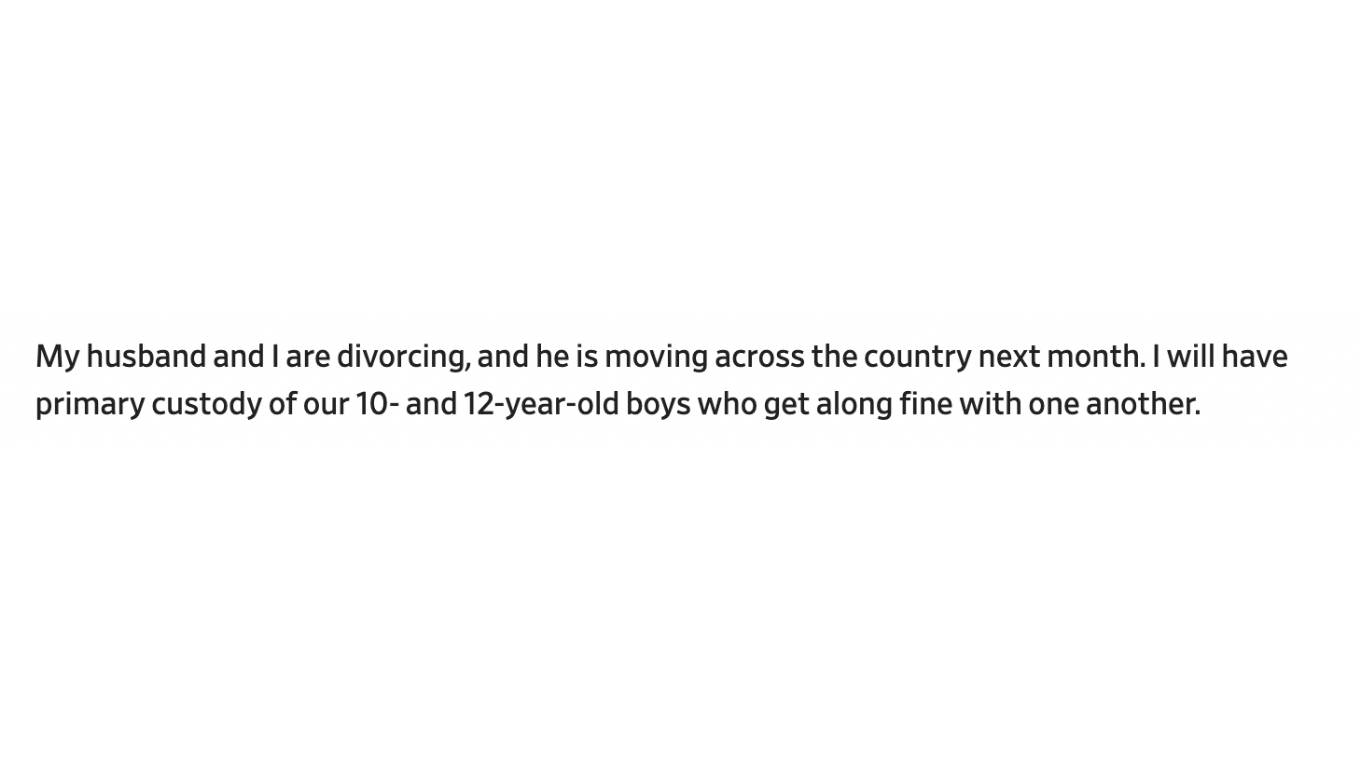
TRIGGER WARNING: This post contains information about suicide, which may be triggering to some.
Seeing your kids struggling is so damn hard. As a parent, it’s so hard to see them hurt. One mom is at a loss with how to help her 10-year-old son, who is really taking her divorce to heart and has recently been talking a lot about suicide. Extremely concerned, the mom asked her son to see a therapist — but he refused. Now she’s not sure how to help him and she’s worried that if she doesn’t act quickly, things will get worse.
The mom wrote to the Care and Feeding column looking for advice.

As she explained in her letter, she and her husband are divorcing and he’s moving across the country next month.
“I will have primary custody of our 10- and 12-year-old boys who get along fine with one another,” she wrote.
The Letter Writer first asked an important question: if there was a “positive and healthy way for my 10-year-old son to think about our family’s breakup?”
The LW explained that she has been using a mantra to get herself through this tough time — ”I will be free” — and she wants her son to have a mantra for when “he is feeling bad.”
“He and his father love each other but will now only spend time together a couple times a year, including half the summer,” the LW explained. “My son knows he is loved, and I have told him that we will get through this and time heals wounds, but it does not make him feel better. Maybe there is no mantra.”
She also asked if there was a good way to get her son help “when he refuses therapy but talks about suicide?”
They have extended family who could lend an ear, but there’s no relative who her son feels really close to.
He told his mom that he doesn’t want to talk to strangers and that it was “enough” that he opened up to the LW.
“He was interested in potentially getting antidepressant medication to feel better, but not if it meant he had to talk to someone,” she added.
The mom did manage to get her son to talk to a therapist a few years ago when her husband first moved out of their house.
And then again last spring, “when he did not want to return to full-time in-person school after months of virtual school, I had him see the school psychologist a couple of times,” she wrote.
But this time her son has threatened to stay home from school if the LW makes him see the school therapist.
“Enticing him with an ice cream or other treats does not work,” the LW lamented. “I called a suicide hotline and the person I spoke to said he does not seem to be in crisis but to keep an eye on him and get him therapy.”
The LW described her son as a “glass half-empty” type and added that depression runs on her soon-to-be ex-husband’s family.
“So he is not taking the divorce and his father’s departure well,” she explained.
“A few weeks ago he said he wanted to commit suicide,” she continued. “A couple times a week since then, he mentions death but not always suicide. For example, he said life isn’t fun and he doesn’t like being a kid without any control.
Now she's not sure what to do. “How should I address this?” she asked.
Most people in the comments section agreed: This was an emergency.
"Oh, no. Therapy is a MUST, absolutely non-negotiable, Son needs to be seeing a therapist YESTERDAY," one person urged.
"LW with the suicidal son, ask him if he'll go with you to family therapy. He may be scared to go thinking he'll be all by himself with a stranger," another commenter suggested. "You do most of the talking [in] the first session so he can see how it works with you there. When you say something about him, ask him if you got it right. But you have to take this seriously."
"In terms of dealing with the depressed child with social/therapy anxiety, the mother does need to get him medical attention and preferably therapy," a third commenter agreed. "I think she could look for a therapist with an emphasis on psychoanalysis or play therapy, with experience building relationships with kids rather than jumping right into poking sensitive issues.
"Or perhaps start with family therapy with the son and her," the person continued. "Or go to a child therapist and spend at least the first session with the child introducing them and helping them get comfortable. She needs to get her son some kind of professional help even if he isn't in crisis, but she needs to get his buy-in and not just send him to someone."
Other people blamed the LW for not acting sooner.
"LW1 seems strangely detached from her suicidal son. He's a child, not an adult that you have no influence over!" one person commented.
"Kids this age absolutely do attempt and complete suicide," another person added. "Usually there are warning signs. In this case the kid is literally telling LW he wants to die. LW is incredibly negligent, more so with each day that goes by that this child does not get help."
"OMG … I had to re-read the first letter a few times to make sure I wasn't missing something. Issue one, how do I help my son feel better about my divorce? Oh, and issue 2 (talk about burying the lede) how can I get him to stop wanting to die?" a third commenter added. "Lady, this is not 'write to an advice columnist' serious … this is 'stop everything and get your son professional help NOW' serious. You're offering him an ice cream? Suggesting a mantra? Holy hell. I am reminded that denial isn't just a river in Egypt."
Columnist Stacia L. Brown agreed that the mom can't wait and see what happens. She needs to act.
"At this point, your son has repeatedly expressed a desire to harm himself and that means that you have a duty to report his suicidal ideation to a mental health professional who is better equipped to treat him than you are," Brown wrote in her response. "This is no longer a situation you can manage on your own, nor is it a situation where your son, as a minor, can decline medical intervention."
She advised the LW not to downplay her sons' conversations about death.
It's not merely a "glass half-empty" mentality or a gloomy disposition — it's something that's urgent and requires immediate help, she explained.
"Though your divorce may have triggered the recent conversations you and your son are having, positive messaging or a 'mantra' about the divorce won’t address what seems like a broader, longer-term and more serious underlying issue," Brown wrote.
"Seek treatment on your son’s behalf," she advised. "Even if he’s initially unhappy about it, the right medical intervention could go a long way toward helping him feel better not just about your changing family dynamic but about his life in general."
Note: If you or any of your loved ones are struggling with suicidal thoughts, you can always reach out to the National Suicide Prevention Lifeline by calling 1-800-273-8255. They are available 24/7 by phone or online chat.




